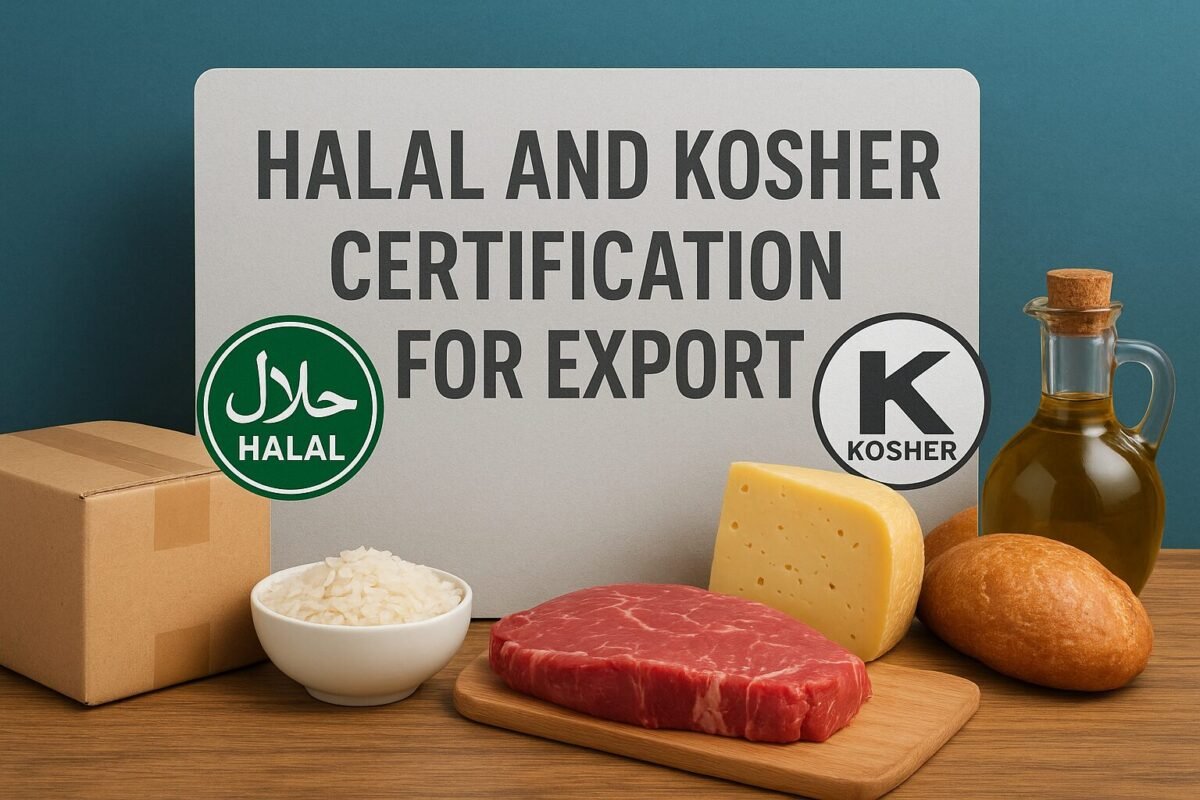
Halal and Kosher Certification for Export
In today’s global economy, exporters face not just legal regulations but also cultural and religious expectations. One of the most significant requirements for accessing certain international markets is Halal and Kosher Certification for Export. These certifications ensure that products meet Islamic and Jewish dietary laws, building trust with consumers and opening doors to new opportunities.
Understanding Halal and Kosher Certification for Export
What Does Halal Certification Mean?
Halal certification confirms that food and products are permissible according to Islamic law (Shariah). This includes the sourcing of ingredients, methods of preparation, hygiene standards, and packaging processes.
What Does Kosher Certification Mean?
Kosher certification ensures products comply with Jewish dietary laws (Kashrut). This involves restrictions on certain animals, specific slaughtering methods, separation of meat and dairy, and maintaining purity during production.
Why Halal and Kosher Certification Matters in Global Trade
Rising Demand in International Markets
With Muslim consumers making up nearly 25% of the global population and Jewish communities representing a dedicated consumer group, demand for certified products is growing rapidly. Exporters without certification risk losing out on these valuable markets.
Access to Restricted Markets
Many Middle Eastern, Southeast Asian, and African countries require Halal certification before products are allowed to enter. Similarly, Kosher certification is vital for exports to Israel, parts of Europe, and the U.S.
Building Consumer Confidence and Brand Reputation
In an era of transparency, certification proves that a brand respects religious values, ethical practices, and consumer trust. This can set exporters apart from competitors in crowded markets.
The Certification Process for Export Businesses
Halal Certification Process for Export
- Application – Submit to an accredited Halal certification body.
- Ingredient Review – Inspection of all ingredients, additives, and suppliers.
- Facility Audit – On-site inspection of hygiene, storage, and preparation standards.
- Certification Approval – Once compliant, the Halal logo can be used on packaging.
Kosher Certification Process for Export
- Application – Provide product and process details to a Kosher agency.
- Ingredient Verification – Review of raw materials and sources.
- Rabbinical Inspection – Rabbi or inspector visits the facility.
- Certification & Renewal – Approval is granted with regular audits for continued compliance.
Benefits of Halal and Kosher Certification for Export
Expanding into New Markets
Certification allows entry into Muslim-majority and Jewish-majority regions where uncertified products are restricted.
Competitive Advantage
Certified goods stand out in the global market as trustworthy and ethically prepared.
Compliance with International Regulations
Many importing countries enforce strict requirements, making certification essential.
Higher Sales and Broader Appeal
Interestingly, non-Muslim and non-Jewish consumers also purchase Halal and Kosher-certified products, associating them with safety, purity, and quality.
Challenges in Obtaining Halal and Kosher Certification
- Cost of Certification – Includes inspection, documentation, and monitoring fees.
- Complex Supply Chains – Ensuring global ingredient compliance is often challenging.
- Regular Audits – Ongoing checks require constant operational discipline.
- Time-Consuming Process – Approvals may take months depending on the product.
Best Practices for Exporters Seeking Certification
Prepare Early for Halal and Kosher Certification for Export
Apply for certification long before entering new markets to avoid delays.
Partner with Globally Recognized Authorities
Work with certification agencies accepted in target countries for smoother approval.
Train Employees and Maintain Transparency
Staff awareness and transparent records help sustain compliance.
Stay Updated with Changing Regulations
Religious guidelines and export requirements evolve — staying informed ensures long-term success.
The Broader Impact of Certification on Global Trade
Halal and Kosher certifications extend beyond religion. They influence global food trends by encouraging:
- Ethical sourcing of ingredients
- Safer and cleaner production methods
- Alignment with global quality standards like HACCP and ISO
Even non-food industries, such as cosmetics, pharmaceuticals, and personal care, are adopting these certifications to expand globally.
Conclusion
In the world of international trade, cultural sensitivity is just as important as product quality. Halal and Kosher Certification for Export gives businesses the tools to build trust, comply with regulations, and unlock new markets. More than just religious labels, these certifications symbolize transparency, ethical practices, and consumer respect.
For exporters, investing in Halal and Kosher certification is not an added cost but a strategic decision — one that paves the way for global growth and long-term success.









